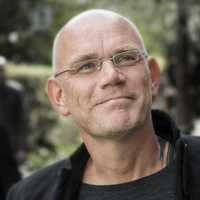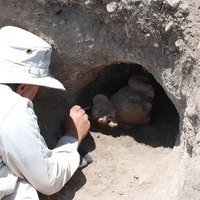Books by Noelle Molé Liston

The Truth Society: Science, Disinformation, and Politics in Berlusconi's Italy
The Truth Society seeks to understand how a period of Italian political spectacle, which regularl... more The Truth Society seeks to understand how a period of Italian political spectacle, which regularly blurred fact and fiction, has shaped how people understand truth, mass-mediated information, scientific knowledge, and forms of governance. Liston scrutinizes Italy's late twentieth-century political culture, particularly the impact of the former prime minister and media mogul Silvio Berlusconi. By doing so, she examines how this truth-bending political era made science, logic, and rationality into ideas that needed saving.
With the prevalence of fake news and our seeming lack of shared reality in the "post-truth" world, many people struggle to figure out where this new normal came from. Liston argues that seemingly disparate events and practices that have unfolded in Italy are historical reactions to mediatized political forms and particular, cultivated ways of knowing. Politics, then, is always sutured to how knowledge is structured, circulated, and processed. The Truth Society offers Italy as a case study for understanding the remaking of politics in an era of disinformation.
Labor Disorders in Neoliberal Italy
Journal Articles by Noelle Molé Liston

Anthropological Quarterly, 2012
Beginning in the mid-1990s and continuing through the 2000s, Italy's population of semi-permanent... more Beginning in the mid-1990s and continuing through the 2000s, Italy's population of semi-permanent or sub-employed workers doubled, while its safeguarded workforce was halved, a trend particularly salient in Northern Italy. In historical tandem with this immense socio-economic transformation, outstanding public attention, originating in the field of occupational psychology, has been focused on a form of workplace harassment called mobbing (il mobbing). Mobbing, I show, both as praxis and site of public discourse, articulates the inchoate threats and ravages of intra-and interclass solidarities which have become the affective trademarks of post-Fordism. It is but one example of everyday labor practices which signal a far deeper proximity between the detached and atomized workers of a market-oriented labor regime and the Fordist ideals of material stability, valorized toil, and, crucially, affective ties. Italy's working populations confront Fordist ruins not only as intangible and nostalgic remnants but as a labor force deprived of solidarity between workers even though workers' affective investment in their labor has intensified. I interrogate how the eerie presence of capitalism's affective past is reincarnated in mobbing discourse, redeployed to signal at once the solidarity-stripping capacity of post-Fordism and the affinity-affirming spirit of Fordism. [
American Anthropologist, 2010
ABSTRACT In Italy, the term precarizzazione (precarious-ization) refers to the process of implem... more ABSTRACT In Italy, the term precarizzazione (precarious-ization) refers to the process of implementing neoliberal policies to transition toward a semipermanent and privatized labor regime but also to the normalization of psychic uncertainty and hypervigilance of worker-citizens. In this article, I examine “precarious workers” and a psychological harassment called “mobbing,” specifically, and suggest that these practices of labor exclusion of a transitional work regime produce emergent subjectivities through an analytics of anticipation. I illustrate the social, political, and psychic effects of imagining neoliberalism, as Italians do in this context, not as complete but, rather, as a metadiscursive object of emotionally charged apprehension and anticipation.
American Ethnologist, 2008
In this article, I examine the codification of an Italian work-related illness caused by mobbing,... more In this article, I examine the codification of an Italian work-related illness caused by mobbing, a type of psychological harassment that emerged at the moment neoliberal policies transformed Italy's historically protectionist labor market. I trace how the medicalization of mobbing has expanded workers’ access to compensation, resources, and discursive tools for criticizing neoliberal labor conditions, even as it has produced new structures of surveillance. I unravel the neoliberal politics of a state that protects workers’ health yet governs worker–citizens through an apparatus of medical experts. I find that workers’ labor problems are experienced and managed as bodily problems in ways important to remaking Italian citizenship. [neoliberalism, state, labor, biopolitics, citizenship, bodies, Italy]
Book Review: Michael Herzfeld's Evicted from Eternity: The Restructuring of Modern Rome

University commencement rituals inhabit Padua's urban landscape, centering on the graduate's read... more University commencement rituals inhabit Padua's urban landscape, centering on the graduate's reading from the papiro, or scroll, in front of friends and family. Scrolls include hypersexualized images of graduates and rhymed poems that recount their lives, particularly sexually explicit moments. I analyze graduation scrolls in both as a ritual and literacy shaping and shaped by gender and classed identities and understandings. How does this reading evoke various linguistic ideologies as scrolls are written in standard Italian, the regional Veneto dialect and English? I interrogate how this linguistic practice both challenges and reinforces existing understandings of gender, sex and class. I also focus on how the actions of graduates during the ritual, and the visual images on scrolls, confirm, and sometimes contradict, the written narrative. After an introduction to the history of scrolls in Padua, I analyze one man's scroll with specific attention to embedded voices and code-switching between Veneto dialect and standardized Italian. Together with ethnographic details, close linguistic analysis, and a variety of theoretical insights, I undertake an analysis of this unique graduation ritual, carefully examining debasement, parody, and the reconstitution of social hierarchies.
Positions by Noelle Molé Liston
Society for Anthropology of Europe: Projects and Publications Chair
Awards by Noelle Molé Liston
Society for the Anthropology of Work 2013 Book Award
Papers by Noelle Molé Liston
Chapter 8. Demonizing Fake News in a Post-Truth Political World
Berghahn Books, Dec 31, 2024
Demonizing Fake News in a Post-Truth Political World
Berghahn Books, Jul 1, 2024
Sonic Ethnography: Identity, Heritage and Creative Research Practice in Basilicata, Southern Italy, Lorenzo Ferrarini and Nicola Scaldaferri (Manchester: Manchester University Press, 2020)
Political and legal anthropology review, Nov 1, 2022

The Truth Society
Cornell University Press, Dec 21, 2020
This book seeks to understand how a period of Italian political spectacle, which regularly blurre... more This book seeks to understand how a period of Italian political spectacle, which regularly blurred fact and fiction, has shaped how people understand truth, mass-mediated information, scientific knowledge, and forms of governance. The book scrutinizes Italy's late-twentieth-century political culture, particularly the impact of the former prime minister and media mogul Silvio Berlusconi. By doing so, the book examines how this truth-bending political era made science, logic, and rationality into ideas that needed saving. With the prevalence of fake news and our seeming lack of shared reality in the “post-truth” world, many people struggle to figure out where this new normal came from. The book argues that seemingly disparate events and practices that have unfolded in Italy are historical reactions to mediatized political forms and particular, cultivated ways of knowing. Politics, then, is always sutured to how knowledge is structured, circulated, and processed. This book offers Italy as a case study for understanding the remaking of politics in an era of disinformation.

The Truth Society: Science, Disinformation, and Politics in Berlusconi's Italy
The Truth Society seeks to understand how a period of Italian political spectacle, which regularl... more The Truth Society seeks to understand how a period of Italian political spectacle, which regularly blurred fact and fiction, has shaped how people understand truth, mass-mediated information, scientific knowledge, and forms of governance. Liston scrutinizes Italy's late twentieth-century political culture, particularly the impact of the former prime minister and media mogul Silvio Berlusconi. By doing so, she examines how this truth-bending political era made science, logic, and rationality into ideas that needed saving. With the prevalence of fake news and our seeming lack of shared reality in the "post-truth" world, many people struggle to figure out where this new normal came from. Liston argues that seemingly disparate events and practices that have unfolded in Italy are historical reactions to mediatized political forms and particular, cultivated ways of knowing. Politics, then, is always sutured to how knowledge is structured, circulated, and processed. The Truth Society offers Italy as a case study for understanding the remaking of politics in an era of disinformation.











Uploads
Books by Noelle Molé Liston
With the prevalence of fake news and our seeming lack of shared reality in the "post-truth" world, many people struggle to figure out where this new normal came from. Liston argues that seemingly disparate events and practices that have unfolded in Italy are historical reactions to mediatized political forms and particular, cultivated ways of knowing. Politics, then, is always sutured to how knowledge is structured, circulated, and processed. The Truth Society offers Italy as a case study for understanding the remaking of politics in an era of disinformation.
Journal Articles by Noelle Molé Liston
Positions by Noelle Molé Liston
Awards by Noelle Molé Liston
Papers by Noelle Molé Liston
With the prevalence of fake news and our seeming lack of shared reality in the "post-truth" world, many people struggle to figure out where this new normal came from. Liston argues that seemingly disparate events and practices that have unfolded in Italy are historical reactions to mediatized political forms and particular, cultivated ways of knowing. Politics, then, is always sutured to how knowledge is structured, circulated, and processed. The Truth Society offers Italy as a case study for understanding the remaking of politics in an era of disinformation.